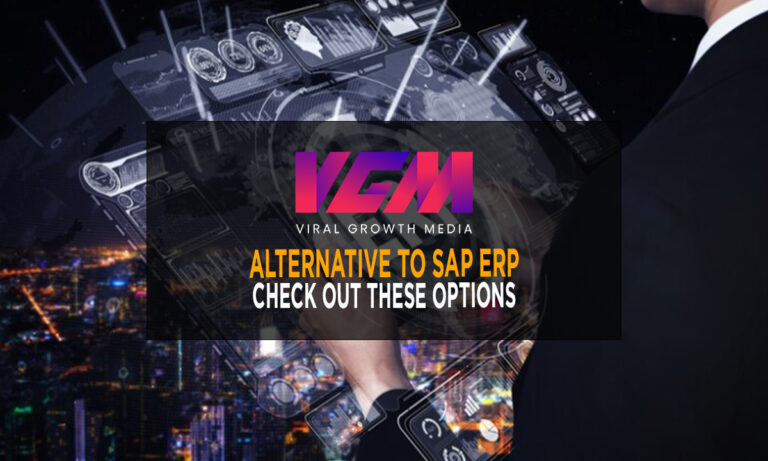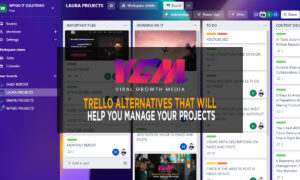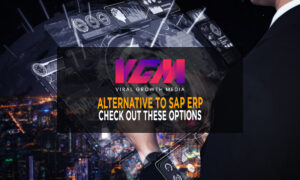You’ve come to the right site if you’re seeking an SAP ERP substitute. We’ll discuss six choices in this blog article that might work well for your company. It’s crucial to conduct research before choosing one of these options because each one has particular advantages. Let’s examine each of these possibilities!
– Odoo:
This open-source ERP system is renowned for its adaptability and user-friendliness. It is also among the more reasonably priced choices available.
– Microsoft Dynamics 365:
This cloud-based ERP solution is supported by one of the biggest software companies in the world and provides a wide range of capabilities.
– Oracle Cloud ERP:
For companies of all sizes, this enterprise resource planning solution provides a full set of features.
– Infor CloudSuite:
This cloud-based ERP system has options for several industries that may be tailored to fit your particular business requirements.
– NetSuite:
For companies of all sizes, this cloud-based ERP solution offers a full set of features.
– Sage Intacct:
This ERP system in the cloud is made for companies of all sizes and provides a wide range of functions.
Before choosing one of these solutions, completing your study is crucial because each offers particular advantages worth considering. When selecting an ERP solution, be sure to take your company’s needs and budget into account. You can streamline your business operations and increase productivity with the right platform!
Choosing the best enterprise resource planning (ERP) software alternative can be challenging for firms looking for ERP software because so many options are available. While SAP’s ERP software can help your business maximize efficiency, depending on your needs, there may be better options. After all, a robust ERP solution should be able to handle the production, finance, and product quality components of a company’s operations.
As a result, if you’re searching for SAP’s ERP alternatives, consider each solution’s essential features and how they might best meet your needs for business administration.

Best SAP ERP Alternatives for Financial Management Features
With the help of features and functions, including working capital management, financial planning and analysis, budgeting, effective billing and business models, and continuous accounting, SAP ERP software is designed to help users manage their finances effectively. By integrating everyone’s finance department, this powerful program affects not only a single person’s money but the financial health of the entire business.
Users may take advantage of these capabilities, leading to a streamlined and integrated financial process. Comparing SAP alternatives in terms of financial management capability is crucial.
-Sage X3
Users of Sage Business Cloud X3 have complete access to and control over the financial management procedures used by their company, in addition to having real-time data visibility. Analytics, notifications, alarms, and customizable inquiries on any data table allow users to get helpful information to improve their financial management.
With the capacity to trace capital expenditures, businesses can monitor their fixed assets throughout their lifecycles. The other financial management components are budgets, commitments, accounts payable, accounts receivable, cost and analytical accounting, cash flow management, bank management, and accounts receivable reports.
-Oracle Netsuite
Oracle Netsuite gives customers the capacity to create reports and projections while also assisting organizations in automating crucial financial procedures. Because of NetSuite’s real-time data visibility, users may get more value from their financial information than ever.
The system also incorporates governance, risk, and compliance capabilities (GRC) and financial consolidation and complies with accounting standards, including ASC 606 and IFRS 15.

Best SAP ERP Alternatives for Manufacturing Features
ERP software called SAP assists companies in streamlining their production procedures. Real-time data insights, MRP (material requirements planning), and production planning are just a few of their capabilities. The extra ERP programs listed below offer their services to assist manufacturers in operating more effectively.
-Plex Systems
For instance, a packaging company might utilize Enterprise Architect to design its facility from the bottom up, improving production management by integrating workers (people), equipment (systems), and supply chains (supply chains). For a better understanding of their business and to maintain quality and control, users can track and analyze data from all aspects of their operations.
The system enhances business operations and production workflows, such as integrating EDI (electronic data interchange) processes for accuracy in supplier activities. Users of the Plex ERP system may lower their risks thanks to the tool’s capabilities for preserving compliance with statutory and industry requirements.
-Epicor
In addition to providing users with real-time inventory and business visibility to streamline operations, Epicor’s manufacturing software also includes tools for forecasting consumer demand, controlling production capacity and costs, and managing financial resources created explicitly for manufacturing processes. Teams can enhance profitability and revenue while accelerating their company’s growth by precisely planning their productivity.
It’s a beneficial program that enables companies to employ cutting-edge technology in their production processes, such as machine learning, artificial intelligence (AI), and the Internet of Things (IoT) (IoT).

Best SAP ERP Alternatives for Supply Chain Management Features
Although supply chain operations may not be straightforward, ERP systems may set them up such that users have control and information. The ERP solution from SAP includes a supply chain management component that provides agile supply chain planning features like supply chain networking, coordination, logistics management, and information management. IFS and Infor CloudSuite, however, also offer robust supply chain management functionalities.
-IFS
This blog post will demonstrate how inventory visibility and management are crucial for your company’s smooth operation. In reality, better stock visibility and control can help businesses satisfy consumer needs, establish solid reputations, and streamline inventory management. Additionally, IFS has effective capabilities for controlling cash flow and inventories that lead to higher profits.
Users can gain from supply chain visibility across their whole ecosystem, which enables them to control costs more effectively, shorten manufacturing life cycles, maintain quality, and accelerate turnaround times. You might be able to identify issues in the supply chain operations, deal with them, and reduce risks with this openness.
-Infor CloudSuite
Users may organize and manage their supply chains more efficiently using Infor CloudSuite ERP. Predictive alerts for significant events will give them real-time awareness of pertinent data and demand signals. This system provides end-to-end resources for an efficient process.
Users can save time and effort by using the program to automate financial procedures, including chargebacks, claims processing, and invoice processing and approval.
The software for managing the product life cycle also uses data to generate insights for more intelligent decision-making. Another essential feature is the product’s collaborative in-network execution tools, which enable users and suppliers to work together in real-time on orders, predictions, and capacity.
How to Choose an SAP ERP Alternative
Choosing the ideal ERP solution for you and your business can be challenging, given the wide range of options available. Make a list of the most essential features to you and would help your business the most if an SAP alternative were to be considered.
If you’re looking for a product that performs a specific function, evaluate if it also offers similar features or achieves the same outcome. Think about if Sage X3’s financial data tables and analytical tools might benefit your business similarly to SAP ERP’s financial analysis tools.
Additionally, some SAP ERP alternatives might offer unique features that are better for your business. For instance, Oracle provides asset lifecycle management, which SAP ERP software does not, to evaluate the financial potential of your assets.

What is SAP ERP, and what are its key features?
A software package called SAP ERP assists companies in managing their fundamental business processes, such as customer relationship management (CRM), finances, human resources, inventories, and supply chain management. Financial accounting, asset management, order management, manufacturing process control, and product lifecycle management are some of their essential characteristics. Although SAP ERP has been around for many years and is a reliable solution for many firms, its implementation may be costly and challenging. There are several options on the market for businesses seeking an SAP ERP substitute.
Here are six of the top SAP ERP alternatives:
-Infor CloudSuite:
A cloud-based ERP solution called Infor CloudSuite provides extensive capabilities for companies across several industries. Manufacturing, CRM, supply chain management, and financial management are some of their essential aspects. Scalable and adaptable Infor Cloudsuite can be tailored to your company’s unique requirements.
-Oracle eBusiness Suite:
With more than 25 modules to support business management, Oracle eBusiness Suite is a complete ERP system. Financials, human resources, procurement, project portfolio management, and customer relationship management are some of its essential aspects. For large businesses searching for an enterprise resource planning system with solid capabilities, Oracle eBusiness Suite is the best option.
-Microsoft Dynamics 365:
Several modules are available in Microsoft Dynamics 365, a cloud-based ERP system that assists companies with their primary activities. Financials, customer relationship management, supply chain management, and project service automation are some of their essential characteristics. A scalable Microsoft Dynamics 365 solution may be tailored to your company’s unique requirements.
-Sage Intacct:
A robust financial management tool for companies across a variety of industries, Sage Intacct, is a cloud-based solution. Its main characteristics are accounting, cash management, purchasing, and order management. Sage Intacct is an affordable option for small to medium-sized organizations searching for an SAP ERP substitute.
-Acumatica Cloud ERP:
A comprehensive cloud-based ERP solution, Acumatica Cloud ERP provides several modules to assist companies with their essential activities. Financials, customer relationship management, supply chain management, and project management are some of their most critical characteristics. Scalable and adaptable, Acumatica Cloud ERP is a solution that can be tailored to your company’s unique requirements.
-Epicor ERP:
Epicor ERP is a complete enterprise resource planning solution that provides strong capabilities for companies in various industries. Financials, human resources, customer relationship management, supply chain management, and manufacturing are some of its main components. For large businesses searching for an enterprise resource planning solution with reliable capabilities, Epicor ERP is the best option.
These are the top six SAP ERP alternatives on the market today. Every solution provides a selection of modules to assist companies with their essential operations. When selecting an SAP ERP replacement, it’s crucial to consider your company’s unique demands and pick a solution that can be scaled and tailored to fit those needs.

Why might businesses be looking for an alternative to SAP ERP?
There are several of them. First, because SAP ERP is so big and sophisticated, managing and implementing it can be challenging. This may result in exorbitant expenses and long implementation times.
Second, some companies believe they are not utilizing SAP ERP to its full potential because they are either not making the best use of the features and functionality they have paid for or are doing so inefficiently for their particular industry.
Finally, some companies just want to experiment. They might be curious to explore if they can get the same or better results with a different ERP system because they have heard positive things about other methods.
Given that SAP is the largest business software provider in the world, it should come as no surprise that their enterprise resource planning (ERP) system, SAP ERP, is among the most widely used ERP systems available. However, not all organizations are suitable for SAP ERP; some find it too complex and expensive to deploy and manage, while others believe they are not receiving the maximum value out of their investment.
A few solutions are available if SAP ERP is not what you need. You may attempt a less expensive and simpler ERP system, such as Infor LN or QAD Enterprise Applications, or you could migrate to a different ERP system, such as Oracle eBusiness Suite or Microsoft Dynamics AX. Finally, you may choose an entirely different category of business software, such as Syspro Enterprise Resource Planning System or IFS Applications.
How to Choose the Right Business Management Software
Selecting the best business management software can be challenging. At Scoro, we’ve assisted hundreds of users in installing new software and found many common problems and questions.
The best business management software options accelerate your company’s expansion while offering long-term benefits. Consider the following details carefully, then select the solution that best meets your company’s needs.
The Top Five Criteria for Selecting Business Software:
-Ease of Use:
The program must be simple to use and intuitive. The training needed to get staff up and running should be low. Modern and uncluttered user interface (UI) designs are best practices. The software should ideally be cloud-based so that anyone can access it from any location and device.
-Flexibility:
The software needs to be adaptable and scalable so that it may expand along with your company. It must be flexible enough to adapt to evolving company requirements and procedures. It should ideally be developed on an open platform that allows easy integration with other programs and infrastructure.
-User Adoption:
The program ought to have a high rate of user adoption. It should be simple to use and beneficial to employees’ work. In a perfect world, it would incorporate elements that promote employee utilization, including gamification or social cooperation.
-Training & Support:
It should include thorough training and support to get the most out of the program. The vendor should provide different degrees of movement, such as online tutorials, live workshops, or one-on-one coaching. Additionally, they ought to provide customer service around-the-clock so you can always get assistance.
-Total Cost of Ownership (TCO):
The total cost of ownership for the program ought to be minimal (TCO). This covers the one-time expenses, like the license fee, and the ongoing expenses, such as maintenance, support, and training. The ideal price structure would be pay-as-you-go, allowing you to only pay for the services you utilize.
These are just a few considerations when searching for SAP ERP alternatives; to learn more about ERP systems and how to pick the best one for your company, download our free buyer’s guide. It contains all the information you require on ERP systems, including features, costs, and implementation advice. And if you’re still unsure about the best solution for your needs, our team of ERP specialists can offer assistance. Please contact us, and we’ll be pleased to help.

What are the Benefits of SAP over other ERP Systems
The corporate technology known as Enterprise Resource Planning (ERP) is extensive and ever-expanding. It serves as the command center for a business’ technological infrastructure, integrating all facets of operations such as product creation, production, marketing, and sales. By combining all of these divisions into a single system.
The beneficiaries of this company’s development include implementers who get attractive pay packages, client organizations who profit significantly from software integration, and end users who gain from straightforward user interfaces.
Even though other ERP software platforms are available, SAP has recently gained popularity for linking and streamlining business activities. Some of the most widely used SAP ERP systems are accounting, personnel management, and other related procedures. Several additional factors demonstrate how SAP differs from different ERP software systems.
Let’s have a look at them:
-SAP is Suitable for any Size of Business, i.e., from Small to Large Size Companies:
SAP may be used by organizations of any size, unlike many ERP systems that are solely used by small businesses. Not to add that SAP provides a complete solution with a simple deployment procedure. Plus, as your business grows and develops, it’s easy to transition with SAP. Additionally, they provide cloud solutions and seamlessly interact with other well-known companies like Google and PayPal, as if that weren’t enough.
Although it is unlikely, this can happen in the ERP industry. Because SAP offers so much room for customization, small businesses can benefit significantly from it. It also includes features and competencies required by the world’s biggest companies. Most Fortune 500 corporations today—including Pfizer, Phillip Morris, and Johnson & Johnson—use SAP.
-SAP is a Global Solution:
The well-known German company SAP AG was founded in 1972 and focused on creating ERP software. There is no denying that the SAP ERP solution is becoming more widely acknowledged because it has been implemented in more than 50 nations.
-SAP does not Provide Any Redundant Functionality:
The terrible truth is that training and time are required for all corporate employees to understand any new ERP system before they can use it effectively. Employees may learn an ERP system more quickly and with less angst if it is brief and straightforward. Unfortunately, few ERP systems, such as Oracle, offer a wide range of services for most businesses—the majority of which are superfluous—leading to a steeper learning curve. Following business needs, SAP ERP only offers the fundamental features; all instructions are kept simple to prevent user confusion or overload.
-SAP is Perfect For any Business:
Out of all ERP systems, SAP has the broadest industry support. The ability of SAP to effortlessly interact with other modules—when one is updated, the others adjust automatically—sets it apart from competing products. Most organizations are unsure about the specific modules or capabilities they want from an ERP system. Though it’s possible that any firm can get what they’re looking for through SAP because it offers a wide range of unique fits for every organization without charging them more for customization as some other companies do.
-SAP Provides Shorter Implementation Time and Fastest Financial Payback:
The most expensive ERP system after Oracle is SAP, but it also offers firms quicker financial reimbursement than its rivals. Additionally, SAP’s installation period is shorter than the norm, enabling higher success rates more quickly.
-As Compared to other ERP Systems, SAP Needs Fewer Customization:
Unlike other ERP systems, SAP includes several novel features, so it needs less customization and can be used more quickly. However, it has been noted that SAP provides a wide range of adaptable solutions for practically every business demand. SAP currently costs more than its rivals, but if Oracle and other companies continue to improve their software products, this could alter in the future.
-Constant Development in SAP:
ERP systems are regularly upgraded by SAP, with each new version succeeding the preceding one. A similar process occurs for various platforms connected to SAP ERP; for instance, the Web Application Server has been replaced by Net Weaver. For example, SAP R/2 was replaced by SAP R/3, which SAP ERP replaced. It’s crucial for businesses to stay current with these developments through software upgrades like those offered by sap as different technologies and procedures become more prevalent in the industry landscape.
-Industry Best Practices:
Businesses may stay competitive by implementing SAP ERP through case studies and industry best practices. Implementing a new software solution requires less money, effort, and risk when such techniques are used as a guide. Using resources more efficiently reduces costs, and modest risks can be avoided by clearing up any uncertainty about how things will turn out.
-Presence of Clearly Defined Roadmaps:
In SAP ERP, the processes are as clearly defined as the roadmaps. These roadmaps are used as a guide during the SAP ERP installation process. The phases of the roadmap are the project preparation phase, the business planning phase, the understanding phase, and the final preparation phase.
Additionally, each phase is divided into a more comprehensive step-by-step manual. Further, SAP ERP includes an implementation assistant to aid in carrying out the implementation strategy. This role extensively uses templates and tools to make the procedure as simple as possible.
-Industry Specific:
Each industry has a unique SAP ERP system designed to match its unique requirements. The system is created in a way that satisfies organizational requirements. For instance, the ERP’s material management module is suitable for the automotive sector but not for accounting. All essential business procedures in diverse industries are assembled into distinct modules.
-Scalability of Software Solutions:
Scalability is a critical component of any successful software solution. ERP solutions are provided by SAP, which stands for Systems, Applications, and Products in the data processing. These solutions are primarily created to support expanding businesses. This implies that the software’s capacity grows along with the organization. Such adaptability is essential to prevent stagnation brought on by internal and external organizational changes.
-Low-risk Method:
The low-risk strategy offered by SAP ERP ensures adherence to the standards for updating figures. This is especially advantageous for highly organized industries like financial services and pharmaceutical industries. The financial services sector needs flexible threshold levels, low capital requirements, and reporting standards.
Based on the firm’s location, SAP’s installation strategy guarantees compliance with US Sarbanes-Oxley Act requirements and international financial reporting standards. This method lessens the risk of incurring fines and a potential audit because of irregularities because it makes SAP essential for big companies with market licenses.
-Developments in SAP across Industry limitations:
It is feasible for more than one industry to benefit from the improvements in the SAP ERP system because of industry-specific identification of such modifications. For instance, an e-recruiting-specific improvement to the Human Capital Management module might be automated ineligibility. Since hiring is a crucial task for all businesses that employ people, this improvement applies to all sectors of the economy.
-Ecosystem Benefit:
Benefits of SAP ERP’s ecosystem. The ecosystem benefits, related to customers, benefit the client firms seeking to install SAP ERP. Contrary to typical customer care services offered by conventional ERP system vendors, this benefit enables clients, partners, and individuals to work on a standardized solution for a specific problem, discussing all SAP ERP-related topics. SAP ERP specialists can detect ongoing and emerging business demands using this feature.
Conclusion
Making the best ERP system selection for your company can be challenging. However, there are so many fantastic solutions out there that it’s crucial to conduct your research and select the system that best suits your needs. We sincerely hope this blog article has given you some direction in your quest and suggestions for qualities to look for in an ERP system. Please don’t hesitate to contact us if you have any questions.























